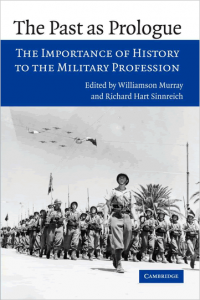 In reading the introduction to The Past as Prologue
In reading the introduction to The Past as Prologue (2006), Williamson Murray puts forth some succinct, yet profound thoughts on history. His overall thesis is that studying military history is critical for not only officers, but for state leaders as well.
Murray immediately recognizes that “current senior leaders seem to have neither the time nor the inclination to look to the past for help.” ((Williamson Murray and Richard Hart Sinnreich, eds., The Past as Prologue: The Importance of History to the Military Profession (New York: Cambridge University Press, 2006), 1.)) Yet, the lack of time cannot be the overwhelming explanation, as leaders, especially American leaders, have enjoyed several lengthy periods of peace, which should have ideally provided time for studying the past.
Instead, Murray believes it is an intellectual challenge,
History raises more questions than it answers. It suggests unpleasant possibilities. It demolishes preferred theories. It often forces leaders to recognize unpalatable truths. Yet, it also suggests possible paths to the future, no matter how uncomfortable. Perhaps most important, it compels them to think dispassionately about potential opponents – their nature, worldview, aims, and options. ((Ibid., 4.))
Amazingly, this short, concise description on reasons why some avoid history is also the best description on why leaders should seek it out. This is more than the simplistic notion of repeating history due to a failure to learn from it. Instead, Murray explains exactly what history can provide us, as it forces us to questions ourselves.
In addition, compelling leaders “to think dispassionately about potential opponents” through the prism of the historical record demonstrates how reading history provides an invaluable intellectual exercise. Modern-day cultures and sensibilities will always cloud analysis of today’s potential enemies. However, thinking through the conflicts between groups such as the Greeks and the Persians, the Romans and the Carthaginians, the Mongols and the Mamalukes, or the English and the Welsh forces the reader, separated by thousands of years, to bring a more objective mind than would be possible by simply remaining in the present.
It is very true that history raises more questions than it answers, but leaders of any state should be thinking through these questions as much as possible.
